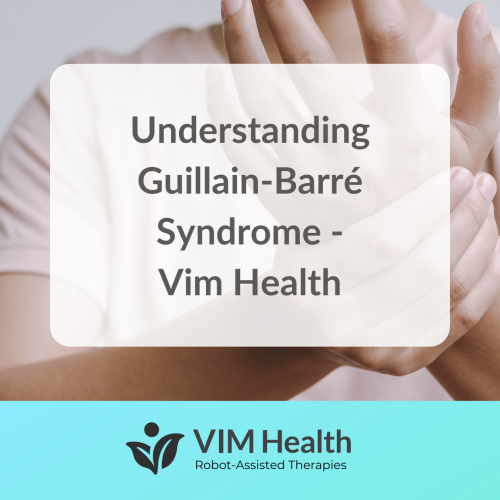Understanding Guillain-Barré Syndrome (GBS) and Rehabilitation Methods for Recovery
Guillain-Barré Syndrome (GBS) is a rare but serious autoimmune disorder in which the body’s immune system attacks the peripheral nervous system, leading to muscle weakness, paralysis, and sometimes life-threatening complications. GBS often begins with weakness or tingling in the legs and can progress rapidly, affecting the ability to move, breathe, or even swallow. This article provides an overview of GBS, its symptoms, and effective rehabilitation strategies for individuals recovering from the syndrome.
What is Guillain-Barré Syndrome?
GBS is a condition where the body’s immune system mistakenly targets its own peripheral nerves, typically after an infection such as a viral illness (e.g., flu, COVID-19, or Zika virus), bacterial infection (e.g., Campylobacter), or surgery. The syndrome is characterised by ascending paralysis, starting in the lower limbs and progressing upwards, and is often accompanied by severe pain, difficulty breathing, and autonomic dysfunction.
The exact cause of GBS remains unclear, but it is thought to involve an autoimmune response that is triggered by an infection. In most cases, GBS develops rapidly and can leave patients unable to walk or perform basic daily tasks.
Symptoms of Guillain-Barré Syndrome
The initial symptoms of GBS include:
- Weakness or tingling in the legs and arms
- Difficulty walking or moving limbs
- Muscle pain and cramps
- Loss of reflexes
- Breathing difficulties (in severe cases)
In severe instances, GBS can cause complete paralysis and organ failure, requiring intensive medical care. Although the exact timeline varies, many individuals recover with appropriate treatment and rehabilitation, though some may experience long-term residual symptoms.
Rehabilitation for Guillain-Barré Syndrome
The recovery from GBS can be lengthy and requires a multidisciplinary approach. Rehabilitation plays a crucial role in helping patients regain strength, function, and independence. The process typically involves physiotherapy, occupational therapy, speech therapy, and psychological support. Below are the key rehabilitation strategies for individuals recovering from GBS:
1. Physiotherapy: Restoring Mobility and Strength
Physiotherapy is central to GBS rehabilitation, as it focuses on restoring strength, mobility, and coordination. For many GBS patients, the initial phase of rehabilitation involves gentle exercises designed to maintain joint flexibility and prevent muscle atrophy. As the patient begins to regain strength, physical therapy progresses to more intensive exercises to improve walking, balance, and posture.
A key aspect of physical therapy for GBS patients is the gradual reintroduction of movement. Studies show that early mobilisation, once the patient is stable, can significantly improve recovery times and reduce long-term disability. Physiotherapists work with patients to assess their capabilities and develop a personalised rehabilitation program that evolves as strength and function return.
2. Occupational Therapy: Promoting Independence in Daily Life
Occupational therapy helps GBS patients regain the skills necessary for daily living, such as dressing, cooking, and personal care. Since GBS can affect fine motor skills and hand-eye coordination, occupational therapists provide strategies and adaptive equipment to help individuals perform tasks that they may find challenging due to weakness or paralysis.
For patients experiencing long-term effects, such as difficulty gripping or holding objects, occupational therapy can help improve hand strength and dexterity. Additionally, home modifications and assistive devices may be suggested to enhance independence and quality of life.
3. Speech and Language Therapy
In severe cases of GBS, the paralysis can affect the muscles involved in swallowing and speaking. For these patients, speech and language therapy (SALT) is an essential part of the rehabilitation process. Therapists work with individuals to improve articulation and the ability to swallow safely. This can involve exercises to strengthen the mouth and throat muscles, as well as strategies to ensure safe eating and drinking.
Speech therapy is crucial for reducing the risk of aspiration (food or liquids entering the airway) and improving the quality of life for GBS patients recovering from these complications.
4. Psychological and Emotional Support
The psychological impact of GBS recovery should not be underestimated. The trauma of experiencing a sudden, life-changing illness and the challenges of rehabilitation can lead to feelings of depression, anxiety, and frustration. Psychological support is an important aspect of rehabilitation, helping patients cope with the emotional and mental health challenges of the recovery process.
Therapists may provide cognitive behavioural therapy (CBT), mindfulness techniques, and counselling to help patients manage stress and maintain a positive outlook during their rehabilitation journey.
5. Multidisciplinary Approach and Long-Term Recovery
The recovery timeline for GBS varies significantly from person to person, and while most individuals make a full recovery, others may experience lasting effects such as fatigue, muscle weakness, and difficulty with coordination. Rehabilitation may continue for months or even years, depending on the severity of the condition.
A coordinated, multidisciplinary approach involving physiotherapists, occupational therapists, speech therapists, and psychologists ensures comprehensive care tailored to the patient’s evolving needs. Patients who receive consistent and well-coordinated rehabilitation are more likely to regain independence and improve their overall quality of life.
Conclusion: Empowering Recovery Through Rehabilitation
While Guillain-Barré Syndrome presents significant challenges, rehabilitation plays a vital role in helping individuals regain their strength, independence, and quality of life.
With advances in rehabilitation practices, individuals with GBS can expect a greater chance of recovery and better outcomes, even if the process is gradual. Early intervention and a multidisciplinary approach are key to supporting patients on their journey to recovery.
At Vim Health we regularly treat people with GBS, to enquire about how we can help you give us a call on 01273 037400.
